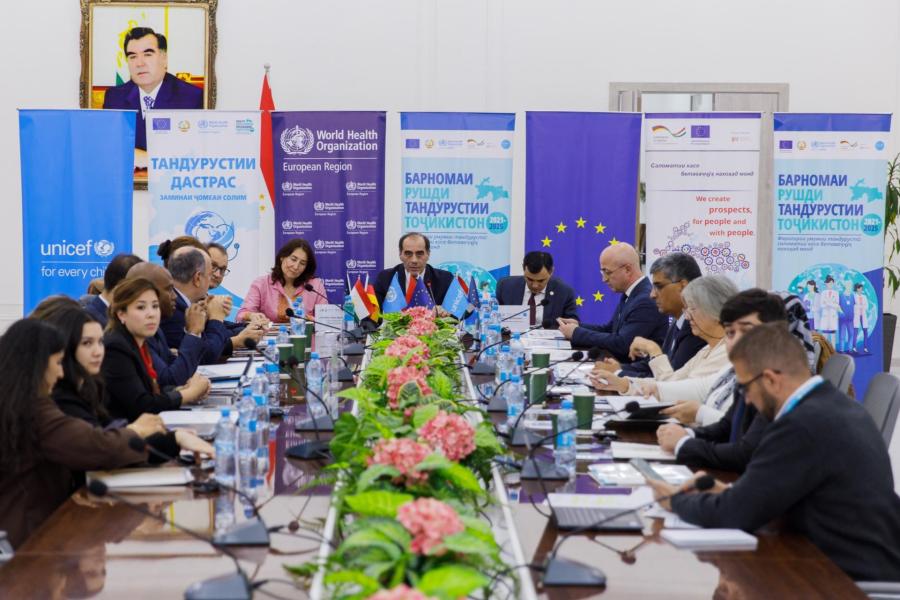European Union-funded Health Development Programme in Tajikistan celebrates key milestones at Third Annual Steering Committee
18 November 2024
High-level representatives from the Ministry of health and social protection of the population and the Ministry of finance, European Union and the implementing partners of the Health Development Programme; World Health Organization, GIZ, and UNICEF, discussed the remarkable achievements of the Health Development Programme (2021 – 2025) as it enters its final year.

The European Union (EU) funds the Health Development Programme to provide crucial support to the Republic of Tajikistan in enhancing health and well-being for all its citizens. Running from 2021 to 2025, the programme aims to ensure that no one is left behind in accessing healthcare, helping the government progress toward Universal Health Coverage (UHC). UHC is a key priority in Tajikistan’s Healthcare Strategy for the Population, which outlines the country’s goals through 2030. This initiative seeks to guarantee that essential health services are available to all Tajiks, without incurring in financial hardship. The programme is implemented in collaboration with three key partners— the World Health Organization (WHO), the Deutsche Gesellschaft für Internationale Zusammenarbeit (GIZ) GmbH, and the United Nations Children’s Fund (UNICEF)— who are working together to strengthen the national health system, making health services more accessible, affordable, and safer.
The Steering Committee convened applauded the significant achievements highlighted by the three implementing partners.
Isabel Uriz Hernandez, Head of Cooperation at the EU Delegation to Tajikistan, congratulated the Ministries of Health and Finance, and WHO, GIZ and UNICEF, for their continuous engagement in the implementation of the programme.
“The Health Development Programme marks the EU’s long-standing presence to support quality and affordable health services for all, as well as the EU’s contribution to make Universal Health Coverage a reality in Tajikistan.” – Isabel Uriz Hernandez
Key achievements in advancing health and well-being in Tajikistan
WHO highlighted Tajikistan's progress in implementing health financing reforms aimed at creating a more resilient and equitable health system. A key milestone in this effort is the approval by the President of Tajikistan of the Government Regulation titled 'On the implementation of new health financing mechanisms in primary health care facilities in pilot cities and districts of Sughd oblast.' This regulation paves the way for significant changes in how healthcare services are financed in Sughd oblast. Moreover, WHO presented on the many impactful studies that were completed during the third year of the programme, which provide key insights to the Government of Tajikistan on how to strengthen the health workforce, improve the way the health system is financed and to advance towards UHC.
GIZ showcased major strides in Tajikistan’s shift toward a Primary Health Care (PHC) system with a focus on family medicine. Key achievements include integrating HIV and tuberculosis services into the PHC system, facilitating easier access to medication and treatment. GIZ has also trained numerous doctors and nurses in family medicine, providing them with high-quality medical kits. A unified examination program for a six-month family medicine refresher course is now implemented across 16 training centres to standardize education. Additionally, six rural health centres have been renovated and fully equipped to better serve local communities. GIZ has also partnered with Tajikistan’s Healthy Lifestyle Centers to support stronger engagement with communities to promote healthy lifestyles.
UNICEF highlighted the completion of the revised Order 1119, which introduces new national infection prevention and control guidelines aligned with the latest global evidence and best practices. The revision also includes improvements to water, sanitation, and hygiene infrastructure to address hospital-acquired infections across all levels of the health system.
Final year of implementation
Key upcoming activities for the final year of the programme:
- Support implementation of a pilot project in Sughd Oblast to improve efficiency of the healthcare system and to reduce out-of-pocket costs for patients.
- Support development of a revised basic benefit package to expand access to essential health services.
- Provide retraining courses for healthcare workers to ensure long-term sustainability.
- Host community engagement events to raise awareness on critical health topics.
- Conduct a micronutrient survey to assess nutrition needs.
- Enhance infection prevention and control with supportive supervision and monitoring.
- Renovate and equip healthcare facilities, including sanitation and solar panel installations.
With over 60 million euros invested in the past decade, the EU remains committed to achieving Universal Health Coverage in Tajikistan. As the Health Development Programme enters its final year, the EU and implementing partners are focused on ensuring sustainable health improvements for all.
For further details, please contact:
WHO: Dr Malika Khakimova, khakimovam@who.int, Dr. Firuza Alieva, alievaf@who.int (about the health development programme, general information).
EU: Ms. Mahbuba Abdulloeva, Mahbuba.ABDULLOEVA@eeas.europa.eu, +992 372217407 (ext. 2061) (Information about EU's ongoing support to Tajikistan)

